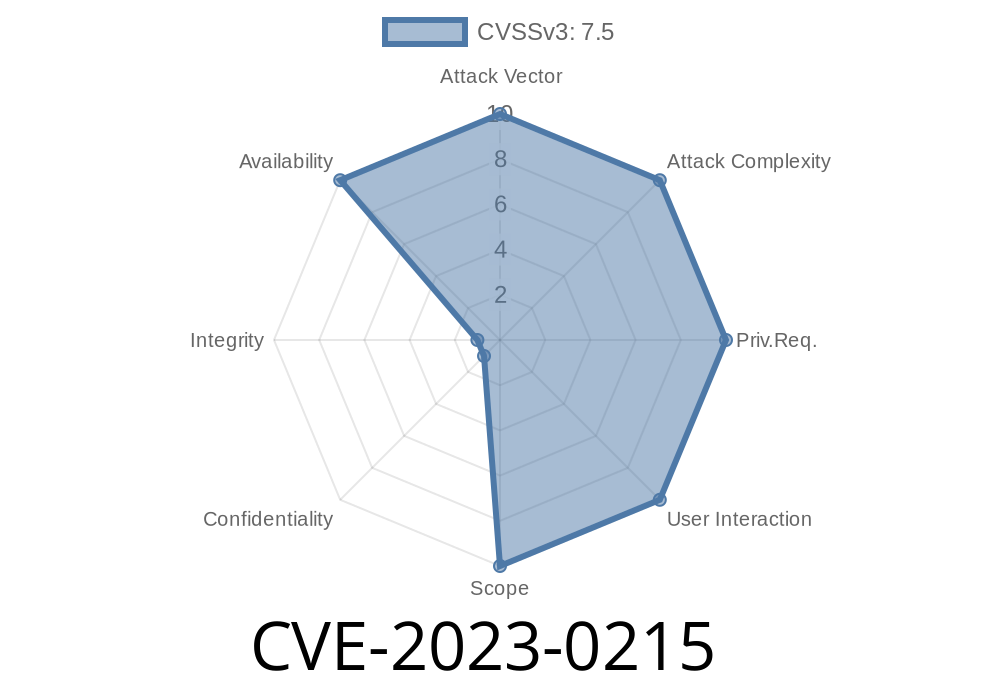OpenSSL is a widely used cryptographic library that underpins countless secure applications and services. While OpenSSL is generally robust, vulnerabilities occasionally slip through, and CVE-2023-0215 is a high-risk example involving a use-after-free bug in OpenSSL’s ASN.1 streaming code. If exploited, this flaw can crash applications, potentially opening the door for attackers. In this post, we’ll break down what CVE-2023-0215 is, how it can be exploited, what code is affected, and how to secure your projects.
What is CVE-2023-0215?
CVE-2023-0215 is a vulnerability found in OpenSSL versions prior to OpenSSL 3..8. It affects the public API function BIO_new_NDEF, a helper used for streaming ASN.1 data through OpenSSL’s BIO abstraction.
Key Details
- The bug occurs when BIO_new_NDEF() fails (for example, due to an invalid CMS recipient’s public key).
- The function attempts to free a filter BIO it added internally, but does not properly clean up the user's original BIO.
- This leaves a dangling pointer in the BIO chain, and a subsequent call to BIO_pop() triggers a use-after-free.
This vulnerability primarily affects code that does ASN.1, CMS, PKCS7, or SMIME streaming. Attackers who can control public keys or input data to these functions may be able to crash the application, which is a denial-of-service (DoS) threat.
Let’s look at a simplified code walk-through to understand how the bug crops up
BIO *bio = BIO_new(...);
BIO *ndef_bio = BIO_new_NDEF(bio, ...);
if (!ndef_bio) {
// BIO_new_NDEF failed, but 'bio' is still referencing a freed BIO
BIO_pop(bio); // Use-after-free bug! Crash likely here
}
BIO_new_NDEF() takes an existing BIO and *prepends* a new ASN.1 filter BIO.
- If something fails after prepending, the function frees the filter, but does *not* update or clean up the original caller-supplied bio.
i2d_PKCS7_bio_stream
The OpenSSL CLI tools cms and smime are also impacted.
Below is a *minimal* C-style pseudocode snippet to show how an application could trigger the bug
#include <openssl/pem.h>
#include <openssl/cms.h>
int main() {
BIO *out = BIO_new(BIO_s_mem());
CMS_ContentInfo *cms = NULL;
X509 *recipient_cert = NULL;
STACK_OF(X509) *recipients = sk_X509_new_null();
// Intentionally load an invalid recipient
recipient_cert = load_invalid_cert(); // user-defined helper
sk_X509_push(recipients, recipient_cert);
// This will cause internal failure and the bug
cms = CMS_encrypt(recipients, NULL, EVP_aes_256_cbc(), );
if (!cms) {
// The next call may cause a use-after-free
BIO_pop(out);
}
// Clean up...
sk_X509_pop_free(recipients, X509_free);
BIO_free_all(out);
}
Note: This will typically just crash the application (denial of service), but under certain memory layouts/debug scenarios, exploitation might go further.
Who Is At Risk?
- Anyone compiling against *affected* OpenSSL versions (< 3..8), especially those doing S/MIME, PKCS7, or CMS streaming operations.
- Command-line use is less likely to be exploited unless callers have control over input keys/certs.
- Servers or tools providing cryptographic streaming features to untrusted users are especially at risk.
Mitigation & Patch
The official fix:
Upgrade to OpenSSL 3..8 or higher.
All major OS distributions have shipped patched versions; see security trackers for updates.
Workarounds:
If you cannot upgrade
- Avoid streaming ASN.1/CMS/PKCS7 data if you take untrusted keys.
OpenSSL Security Advisory:
https://www.openssl.org/news/secadv/20230207.txt
CVE Details:
https://nvd.nist.gov/vuln/detail/CVE-2023-0215
https://www.cve.org/CVERecord?id=CVE-2023-0215
OpenSSL Documentation:
https://www.openssl.org/docs/man3./man3/BIO_new_NDEF.html
Conclusion
CVE-2023-0215 showcases that even deep-internal helper functions like BIO_new_NDEF() can expose subtle and dangerous bugs. Use-after-free vulnerabilities can quickly escalate problems in memory-unsafe languages like C, leading to crashes or worse. The best protection is to keep your dependencies patched and review your application’s interactions with complex cryptographic APIs.
Stay Safe:
Consider fuzz testing and static analysis to catch similar bugs early.
If you suspect your project may be affected and need more guidance, reference the links above or consult the OpenSSL project. Don’t wait until attackers find your weak spot!
Timeline
Published on: 02/08/2023 20:15:00 UTC
Last modified on: 02/24/2023 15:15:00 UTC
